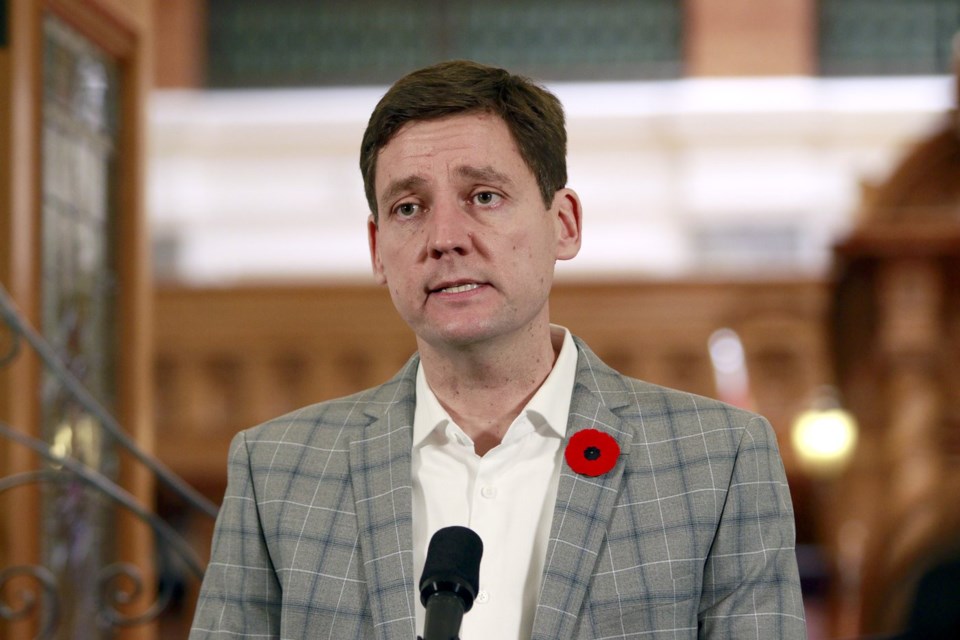British Columbia Premier David Eby said Canada had to approach Donald Trump's plan to impose a 25 per cent U.S. tariff on Canadian goods from a position of strength, as business, trade and community organizations called for quick action on the trade threat.
Eby said premiers and Prime Minister Justin Trudeau would meet this week to discuss "our strategic approach" to the U.S. president-elect's plan to impose the tariff on Canadian and Mexican imports immediately after his inauguration on Jan. 20, unless action was taken to stem the cross-border flow of migrants and illegal drugs.
The B.C. premier made the comments Tuesday in a speech to the annual convention of the B.C. Federation of Labour in Vancouver.
"Obviously, this will be devastating to workers on both sides of the border," he said. "Both in the U.S. and in Canada the impact on families will be profoundly significant."
Canada and the U.S. have long been top trading partners, on imports as well as exports, and the strength of this relationship put Canada in a solid position when it came to Trump's tariff threat, Eby said.
"We have more in common with Americans than what separates us," he said. "We buy more American stuff than France, than China and Japan and the United Kingdom combined. So, we are negotiating, I believe, from a position of strength."
Eby acknowledged improvements could be made on Canada's border, especially when it came to policing contraband and illegal drugs.
"We've called repeatedly, for example, for port police to ensure what comes into B.C. is not contraband, is not illicit drugs or precursor chemicals," he said. "These are things that we can do to make life better here in B.C., as well as respond to concerns that have been raised south of the border."
Trump issued a statement on social media on Monday saying Canada and Mexico had the power to solve their border issues, which he called a "long simmering problem."
Business organizations in B.C. called on the provincial and federal government to immediately address Trump's tariff plan that they said would will hurt businesses.
The proposal would have “significant consequences” for B.C. businesses of all sizes and would harm communities and workers across the province, said Fiona Famulak, B.C. Chamber of Commerce president and chief executive officer.
“Ottawa must take this news seriously and work proactively with representatives of the incoming US administration immediately to address the issue before the tariffs are implemented," she said in a statement. "We cannot afford to wait until January to take action."
The Metro Vancouver city of Surrey, which has two U.S. border crossings, said in a statement the proposed tariff would have severe implications for the city's business community.
Most of B.C.'s manufacturing industry is located in Surrey and the city is also home to many thriving import-export reliant businesses, which would face increased costs and potential job losses if the U.S. tariff was imposed, said Jasroop Gosal, Surrey Board of Trade spokesman.
The B.C. Lumber Trade Council said the proposed tariff would hurt U.S. consumers and homebuyers by driving up the cost of building materials from Canada, while the Greater Vancouver Board of Trade said the U.S. was B.C.’s most important trading partner, accounting for 54 per cent of the province’s commodity exports in 2023.
"It is imperative that we engage constructively with our U.S. counterparts to advance our collective interests," said Bridgitte Anderson, board of trade president and CEO.
"This should act as a wake-up call to all levels of government that a new Team Canada approach is required."
She said some of B.C.’s top exports to the U.S. are natural gas, softwood lumber, agricultural products and minerals and metals.
Opposition B.C. Conservative Leader John Rustad called for the immediate recall of the B.C. legislature to provide funding to secure borders to stop the flow of illegal drugs and migrants.
B.C. government data says the province's exports to the U.S. in the first half of 2024 were worth $16.9 billion, down 1.1 per cent compared to the same period last year.
The U.S. is by far B.C.'s largest export destination, with mainland China in second place receiving goods worth $4.9 billion in the year to July, up 13.2 per cent.
This report by The Canadian Press was first published Nov. 26, 2024.
Dirk Meissner and Nono Shen, The Canadian Press




